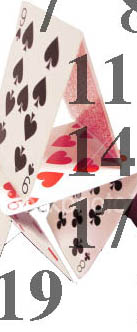
Producerlike Behavior: “Why Do They Make Queen Better Than Jack? Oh, I Get It: They’re Both The Masters (HELLLOOO!)”
Oliver pauses at one moment in the game we played to wonder about what Gee calls the “internal design grammar” of card games (in general). What is noteworthy is that Oliver is aware that games are designed, that characters (or pieces) are assigned different values. In much of the world Oliver inhabits (public school, friends’ houses, movies/cartoons), there is a rigid policing of gender (often sexist) distinctions between girls (and their toys) and boys (and their toys). Oliver realizes that boys (and their toys) are often privileged so he wonders why the Queen, a female character, has more power than the younger, but male, Jack. He figures it out himself, finding the semiotic explanation in the royal family structure, the heterosexual/ageist regime of two “masters” (King and Queen) ruling over lesser family members, something with which he has first-hand experience try as hard as his mother and I might to use “nonviolent communication” techniques and, in general, to respect him as an autonomous being.
One: Situating Embodied Learning
-
Identity and Learning: “Follow What I Am Doing: Do The Rules That I’m Doing: It’s Very CoM-pli-cated”
- Producelike Behavior: "Why Do The Make Queen Better Than Jack?"
- Conclusion: "The Bricolage, The Music, The Movement"
Three: Implications for the Literacy Autobiography Assignment
